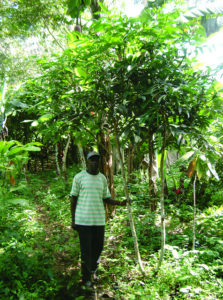
Originally published at ICRAF’s Agroforestry World Blog
The global economy is consuming our available resources about one-and-a-half times as fast as they regenerate. Trees play a prominent role in our attempts to buck this trend. ICRAF communication expert Sander van de Moortel explains.
Just as companies, countries and households need to keep a positive balance, running a tight planet requires careful planning to offset expenditure by income. Instead, humanity is blowing its 2016 allowance on 8 August, about 145 days before payday.
Earth Overshoot Day, as this infamous occasion is called, is calculated annually by the Global Footprint Network(GFN), an international think-tank aimed at keeping the human economy within Earth’s ecological limits. Overshoot Day is reached when the human economy has effectively used more resources than the planet’s biological capacity, or the amount of resources it can generate in a year. When we reach Overshoot Day, we are depleting our fishing grounds, releasing more CO2 into the air than our trees and oceans can absorb, and harvesting more forest than can regrow that year.
The GFN started calculating Earth Overshoot Day in 2006, when our environmental currency still lasted us until October. Last year, we barely made it until 13 August. Indeed, by overshooting our budget at ever faster rates, we are effectively indebting ourselves and our children for generations to come. If we adhere to the goals set by the Paris climate agreement adopted by nearly 200 countries in December 2015, the carbon footprint will need to gradually fall to zero by 2050. Now is the time to reverse the trend and push Overshoot Day to 31 December, where it belongs.

Global solutions for a global problem
‘The good news is that we are technologically up to the task,’ says Mathis Wackernagel, co-founder and CEO of Global Footprint Network. ‘We will even run a profit.’ Emerging sectors like renewable energy get a boost, and we will lower the cost of dealing with climate change, such as accommodating climate refugees or restoring damage after freak weather incidents… The only resource we still need more of is political will,’ says Wackernagel, so everyone needs to contribute to make that happen.
Individuals can chip in by eating less meat, wearing clothing adapted to the outside temperature indoors, or by cutting unnecessary car commutes. The Overshoot Day website suggests a number of pledges and will reward a GoPro camera to the three best images of yourself fulfilling the pledge.
Many countries, too, are picking up the gloves. Renewable energy generators are popping up like mushrooms all over the world and China has pledged to cut its meat consumption by 50% by 2030, which should have a tremendous impact on carbon emissions.
Trees: no longer just carbon storage
Meine van Noordwijk, Chief Science Advisor at the World Agroforestry Centre and coordinator of the landscapes theme of the CGIAR Research Program on Forests, Trees and Agroforestry, believes that the correct use of trees in our landscapes, farms and cities is instrumental for fulfilling our goal of pushing back Overshoot Day. It has been long known that trees help restore landscapes and reduce our ecological footprint, especially on farms, which typically have a relatively poor ecological track record. The combination of trees, crops and livestock on farmland is a discipline called agroforestry, ICRAF’s main research interest.
‘There are many good scientific reasons to include trees in our farmland,’ says van Noordwijk. ‘They can act as natural fertilizer, offset the warming effects of climate change, prevent runoff, preserve moisture, provide a safe haven for vital wildlife, all the while providing an income for their owners through the sale of their fruit and timber.’
Besides these advantageous properties of trees, until recently their key selling point for climate scientists was that they actively absorb carbon out of our atmosphere and store it in the soil, where it no longer contributes to climate change.
Also read: Trees on farms: the missing link in carbon accounting
Good news in that regard comes from a recent research paper published in Nature by ICRAF scientist Robert Zomer and colleagues. Through remote sensing, Zomer calculated that 43% of all agricultural land globally has at least 10% tree cover and that this figure has been steadily rising over the last decade. Booming economies such as Brazil, Indonesia, China and India are leading the pack with the largest increases in stored carbon.
ICRAF’s scientists have more hopeful news. Van Noordwijk and the Partnership for the Tropical Forest Margins have recently published new research suggesting that forests and trees may have an even more important benefit than storing carbon: directly causing rainfall.
This would mean that the predicted freshwater shortages may be avoidable in all parts of the planet, doubling the value of trees as the woody guardians of our planet. In addition, it would help us better understand rainfall as a key climate variable.











